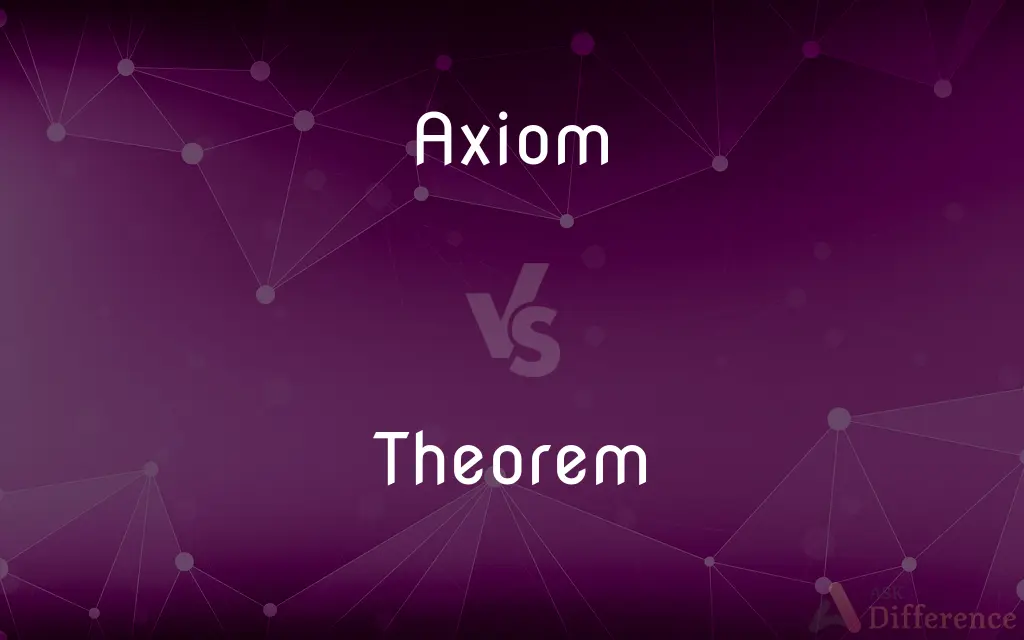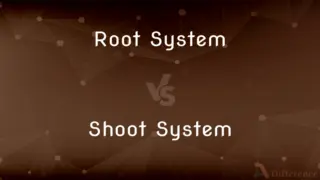Axiom vs. Theorem — What's the Difference?
By Tayyaba Rehman — Published on November 27, 2023
An Axiom is a self-evident truth or universally accepted principle, while a Theorem is a statement proven based on axioms or other theorems.

Difference Between Axiom and Theorem
Table of Contents
ADVERTISEMENT
Key Differences
An Axiom serves as the foundational stone in various fields, especially in mathematics and logic. They are accepted without any need for proof. On the other hand, a Theorem stands as a statement that requires proof, utilizing the given axioms or previously established theorems.
While Axioms are universally recognized as self-evident truths, Theorems demand rigorous validation. To derive a Theorem, one often uses logical reasoning, combining axioms and other known theorems. This process ensures that the Theorem is a valid conclusion based on the set groundwork.
In the realm of mathematics, Axioms are indispensable. They form the bedrock upon which entire mathematical systems are constructed. Theorems, however, showcase the beauty and intricacy of these systems, revealing deeper insights once they're proven.
Both Axioms and Theorems are critical to advancing knowledge. Axioms, by their very nature, are unprovable within their system, yet they're crucial for system construction. In contrast, Theorems offer opportunities for researchers to dive deep, explore, and unearth new truths by leveraging the foundational axioms.
Though Axioms and Theorems have distinct roles, their interplay is what propels disciplines like mathematics forward. While Axioms set the stage, Theorems shine the spotlight on the complexities and nuances, offering a richer understanding of the subject at hand.
ADVERTISEMENT
Comparison Chart
Definition
A self-evident truth or principle.
A statement or proposition proven using axioms.
Proof Requirement
Accepted without proof.
Requires proof.
Role
Foundational principle.
Derived statement based on foundational principles.
Nature
Universal and self-evident.
Proven using logic and previously known statements.
Usage
To establish a system's groundwork.
To expand or clarify understanding within a system.
Compare with Definitions
Axiom
Axiom is a principle accepted without evidence.
In geometry, it's an Axiom that parallel lines never meet.
Theorem
Theorem is a proven mathematical statement.
Pythagoras' Theorem is foundational in triangle geometry.
Axiom
Axiom stands as a universally accepted idea.
The idea that whole is greater than its part is an ancient Axiom.
Theorem
Theorem illuminates deeper insights in a field.
Euler's Theorem opened new doors in number theory.
Axiom
Axiom is a foundational statement in logic and mathematics.
The commutative property of addition is an Axiom in arithmetic.
Theorem
Theorem is a conclusion drawn from previously established premises.
Using basic properties of numbers, one can prove the Theorem that every even integer greater than 2 is the sum of two prime numbers.
Axiom
Axiom is a self-evident truth.
Actions have consequences is an Axiom in life.
Theorem
Theorem stands as a tested and confirmed truth in a system.
Through rigorous proof, the Theorem that there are infinitely many prime numbers was established.
Axiom
Axiom operates as a premise or starting point.
In a debate, both sides often agree on a basic Axiom before discussing further.
Theorem
An idea that has been demonstrated as true or is assumed to be so demonstrable.
Axiom
A self-evident or universally recognized truth; a maxim
“It is an economic axiom as old as the hills that goods and services can be paid for only with goods and services” (Albert Jay Nock).
Theorem
(Mathematics) A proposition that has been or is to be proved on the basis of explicit assumptions.
Axiom
An established rule, principle, or law.
Theorem
(mathematics) A mathematical statement of some importance that has been proven to be true. Minor theorems are often called propositions. Theorems which are not very interesting in themselves but are an essential part of a bigger theorem's proof are called lemmas.
Axiom
A self-evident principle or one that is accepted as true without proof as the basis for argument; a postulate.
Theorem
A mathematical statement that is expected to be true
Fermat's Last Theorem'' was known thus long before it was proved in the 1990s.
Axiom
(philosophy) A seemingly self-evident or necessary truth which is based on assumption; a principle or proposition which cannot actually be proved or disproved.
Theorem
(logic) A syntactically correct expression that is deducible from the given axioms of a deductive system.
Axiom
A fundamental assumption that serves as a basis for deduction of theorems; a postulate (sometimes distinguished from postulates as being universally applicable, whereas postulates are particular to a certain science or context).
Theorem
(transitive) To formulate into a theorem.
Axiom
An established principle in some artistic practice or science that is universally received.
The axioms of political economy cannot be considered absolute truths.
Theorem
That which is considered and established as a principle; hence, sometimes, a rule.
Not theories, but theorems ( ), the intelligible products of contemplation, intellectual objects in the mind, and of and for the mind exclusively.
By the theorems,Which your polite and terser gallants practice,I re-refine the court, and civilizeTheir barbarous natures.
Axiom
A self-evident and necessary truth, or a proposition whose truth is so evident as first sight that no reasoning or demonstration can make it plainer; a proposition which it is necessary to take for granted; as, "The whole is greater than a part;" "A thing can not, at the same time, be and not be."
Theorem
A statement of a principle to be demonstrated.
Axiom
An established principle in some art or science, which, though not a necessary truth, is universally received; as, the axioms of political economy.
Theorem
To formulate into a theorem.
Axiom
A saying that widely accepted on its own merits
Theorem
A proposition deducible from basic postulates
Axiom
(logic) a proposition that is not susceptible of proof or disproof; its truth is assumed to be self-evident
Theorem
An idea accepted as a demonstrable truth
Theorem
Theorem is a proposition validated using axioms.
The Fundamental Theorem of Arithmetic deals with prime number factorization.
Common Curiosities
Do Axioms vary between different mathematical systems?
Yes, different systems can have different sets of Axioms as their foundations.
How does a Theorem differ from an Axiom?
While an Axiom is a foundational statement accepted without evidence, a Theorem is a proposition that's been rigorously proven based on axioms or other theorems.
Can a Theorem become an Axiom?
Typically, no. Axioms are foundational, whereas Theorems are derived from those foundations.
Can Axioms be controversial?
Yes, especially when they lead to undesirable or contradictory results within a system.
Can you provide an example of a famous Theorem?
One famous Theorem is Fermat's Last Theorem, which took centuries to prove.
What is an Axiom?
An Axiom is a universally accepted principle or a self-evident truth that doesn't require proof.
Why is proving a Theorem important?
Proving a Theorem ensures its validity within the system, allowing for further developments and discoveries.
What happens if a Theorem is found to be incorrect?
If a Theorem's proof is found flawed, it needs to be re-evaluated or discarded.
Do all mathematical disciplines have Axioms?
Most do, as Axioms provide the foundational truths upon which the discipline is built.
How is a Theorem proven?
A Theorem is proven using logical reasoning and by relying on axioms and previously established theorems.
Is every Axiom true?
Axioms are accepted as true within their system, but they are chosen based on their usefulness and consistency.
Are all Theorems derived from Axioms?
Directly or indirectly, yes. Theorems are derived from axioms or other proven theorems.
Are Axioms limited to mathematics?
No, Axioms can be found in various disciplines, including logic and philosophy.
Share Your Discovery

Previous Comparison
Piano vs. Casio Keyboard
Next Comparison
Root System vs. Shoot SystemAuthor Spotlight
Written by
Tayyaba RehmanTayyaba Rehman is a distinguished writer, currently serving as a primary contributor to askdifference.com. As a researcher in semantics and etymology, Tayyaba's passion for the complexity of languages and their distinctions has found a perfect home on the platform. Tayyaba delves into the intricacies of language, distinguishing between commonly confused words and phrases, thereby providing clarity for readers worldwide.












































